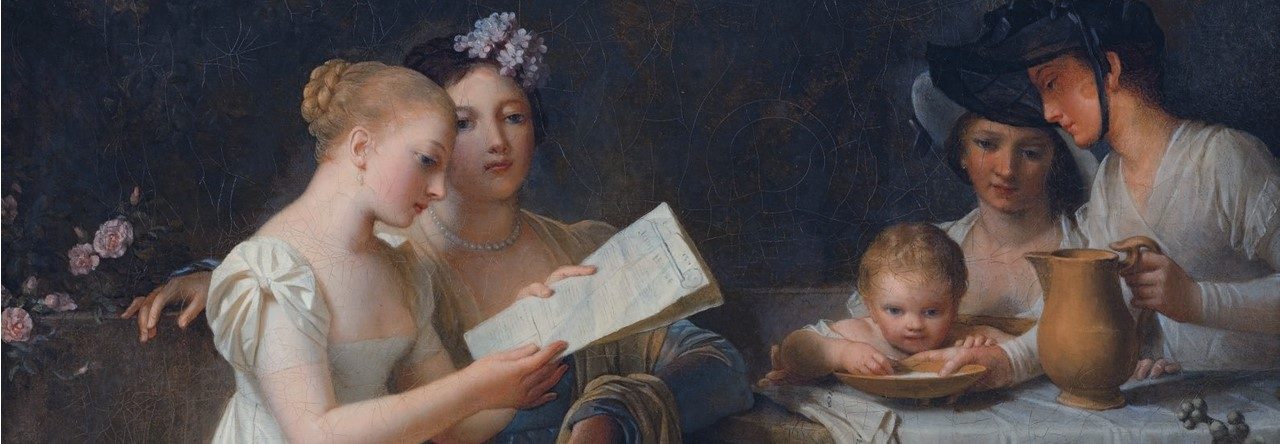The Lower Bottleby Weekly Register, October 27, 1814
The village bade farewell last week to Miss Ann Dunwood, heretofore the resident organist and choir director at the our dear church of Saint Cunigunda in the Fields. The lady actually left rather abruptly and folk hereabouts had little opportunity to bid her farewell or any wishes whatsoever. There have, however, been reactions.

Margaret Plumbottom informed the Register that Miss Dunwood, while a pleasant enough young person, often expressed tastes in music so questionable as to put many in dislike of her. She hinted the woman may have been forced out by “certain persons prone to vicious talk.” Mrs. Plumwood insists she herself is not inclined to be so harsh. “The chit simply needs to grow up a bit. She’ll understand the importance of the soothing and familiar when she is mature.”
Can questionable music be at the root of the matter? “Likes them German composers, the modern ones like Ludwig van Beethwhatnot. I heard her pounding out some such wild music on the vicarage piano—loudly—when our beloved Reverend Pettigrew and his good wife were away,” Lorena Blodget informed our reporter. This woman felt it her Christian duty to report the incident to the vicar. “The vicar saw to it she was counseled on the matter,” the woman told us.

When asked, Mabel Crouch, first soprano in the Saint Cunigunda choir these many years, refused to speak on the matter. “What’s done is done,” she said. “We will go back to the way things ought to be with proper hymns next Sunday.” After thought she recommended the reporter speak to Ernest Hackett, the church custodian.
Mr. Hackett professed to have no information about why the woman left. “Don’t know much about th’ music, but that woman were hard on the organ I can tell you that. Th’ village is lucky to have one, small though it is. Had to repair it twice when she played on it too hard. Sweet girl though. I wish her well.”
Reverend Pettigrew gave our reporter short shrift, claiming he had to work on Sunday’s sermon, though it was only Wednesday. We could only squeeze a few comments about the departed musical director. “She played well enough for a woman,” he said. “Left us in a lurch though.”
He pulled the door shut before the reporter could ask another question, but it opened back up, and the vicar’s wife’s head popped out. “You should be asking where she went,” the woman whispered. “Off to the wilds of Ornkey, up there in the far north. Uncivilized, I say.” She dropped her voice even lower, but we believe she said, “Left with that man from Edinburgh they call the Marriage Maker. Make something out of that.” The door shut for good.

About the Book
Sir Alexander Bradshaw needs a wife, a sensible woman to manage his unruly sons and sullen daughter. No suitable candidates appear, however, and Alec resigns himself to spend another long, dark Orkney winter companionless. When an acquaintance suggests a music teacher might occupy his daughter, he embraces the idea.
Ann Dunwood travels to Orkney for the opportunity to play the Kirkwall organ. For the beauty of the instrument, Ann endures the conservative choir members who wish to perform the most banal of hymns; she’s done it before. She knows how to fade into the shadows and keep to her place.
When he happens upon Ann in the cathedral, Alec is enchanted by the woman at the keyboard, who fills the room with a Bach fugue. Yet, when the music ends, the object of his fascination turns into a demure mouse. Alec determines to reignite the passion he glimpsed in her and fill his home with music.
Available October 1. Pre-order now.
About the Author
Caroline Warfield has been many things.Now in at least her third act, she works in an office surrounded by windows where she lets her characters lead her to adventures in England and the far-flung corners of the British Empire. She nudges them to explore the riskiest territory of all, the human heart.



Leave a Reply